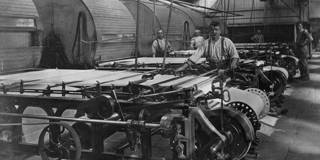David Ricardo, one of the founders of modern economics in the early 1800s, understood that machines are not necessarily good or bad. His insight that whether they destroy or create jobs all depends on how we deploy them, and on who makes those choices, could not be more relevant today.
BOSTON – Artificial intelligence and the threat that it poses to good jobs would seem to be an entirely new problem. But we can find useful ideas about how to respond in the work of David Ricardo, a founder of modern economics who observed the British Industrial Revolution firsthand. The evolution of his thinking, including some points that he missed, holds many helpful lessons for us today.
Private-sector tech leaders promise us a brighter future of less stress at work, fewer boring meetings, more leisure time, and perhaps even a universal basic income. But should we believe them? Many people may simply lose what they regarded as a good job – forcing them to find work at a lower wage. After all, algorithms are already taking over tasks that currently require people’s time and attention.
In his seminal 1817 work, On the Principles of Political Economy and Taxation, Ricardo took a positive view of the machinery that had already transformed the spinning of cotton. Following the conventional wisdom of the time, he famously told the House of Commons that “machinery did not lessen the demand for labour.”

BOSTON – Artificial intelligence and the threat that it poses to good jobs would seem to be an entirely new problem. But we can find useful ideas about how to respond in the work of David Ricardo, a founder of modern economics who observed the British Industrial Revolution firsthand. The evolution of his thinking, including some points that he missed, holds many helpful lessons for us today.
Private-sector tech leaders promise us a brighter future of less stress at work, fewer boring meetings, more leisure time, and perhaps even a universal basic income. But should we believe them? Many people may simply lose what they regarded as a good job – forcing them to find work at a lower wage. After all, algorithms are already taking over tasks that currently require people’s time and attention.
In his seminal 1817 work, On the Principles of Political Economy and Taxation, Ricardo took a positive view of the machinery that had already transformed the spinning of cotton. Following the conventional wisdom of the time, he famously told the House of Commons that “machinery did not lessen the demand for labour.”